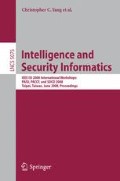Abstract
Nowadays, computer crimes involving e-mail increases rapidly. To prevent these phenomena from happening, the authorship identification methods for Chinese e-mail documents were described in this paper, which could provide evidence for the purpose of computer forensic. The theoretical framework was presented. Various style features including linguistic features, structural characteristics and format features were analyzed. The support vector machine algorithm was used for learning algorithm. To validate the methods, experiments were made on limited dataset. The results were satisfying, which proved that the methods were effective and feasible to apply to computer forensic.
Access this chapter
Tax calculation will be finalised at checkout
Purchases are for personal use only
Preview
Unable to display preview. Download preview PDF.
References
Mosteller, F., Wallace, D.L.: Inference and Disputed Authorship. Addison-Wesley Publishing Company, Inc., Reading (1964)
Elliot, W., Valenza, R.: Was the Earl of Oxford the true Shakespeare? Notes and Queries 38, 501–506 (1991)
Krsul, I.: Authorship analysis: Identifying the author of a program. Technical report, Department of Computer Science, Purdue University (1994)
Krsul, I., Spafford, E.: Authorship analysis: Identifying the author of a program. Computers and Security 16, 248–259 (1997)
Sallis, P., MacDonell, S., MacLennan, G., Gray, A., Kilgour, R.: Identified: Software Authorship Analysis with Case-Based Reasoning. In: Proc. Addendum Session Int. Conf. Neural Info. Processing and Intelligent Info. Systems, pp. 53–56 (1997)
Crain, C.: The Bard’s fingerprints. Lingua Franca, pp. 29–39 (1998)
Abbasi, A., Chen, H.: Applying Authorship Analysis to Extremist-Group Web Forum Messages. IEEE Intelligent System 20(5), 67–75 (2005)
Zheng, R., Qin, Y., Huang, Z., Chen, H.: A Framework for Authorship Analysis of Online Messages: Writing-style Features and Techniques. Journal of the American Society for Information Science and Technology 57(3), 378–393 (2006)
de Olivier, V.: Mining E-mail Authorship. In: KDD 2000 Workshop on Text Mining, ACM International conference on knowledge Discovery and Data Mining, Boston, MA, USA (2000)
de Olivier, V., Anderson, A., Corney, M., Mohay, G.: Multi-Topic E-mail Authorship Attribution Forensics. In: ACM Conference on Computer Security - Workshop on Data Mining for Security Applications, Philadelphia, PA (2001)
Tsuboi, Y.: Authorship Identification for Heterogeneous Documents. Nara Institute of Science and Technology, University of Information Science, Japanese (2002)
Yang, Y.: An evaluation of statistical approaches to text categorization. Journal of Information Retrieval 1, 67–88 (1999)
Vapnik, V.: The Nature of Statistical Learning Theory. Wiley, New York (1998)
Author information
Authors and Affiliations
Editor information
Editors and Affiliations
Rights and permissions
Copyright information
© 2008 Springer-Verlag Berlin Heidelberg
About this paper
Cite this paper
Ma, J., Li, Y., Teng, G. (2008). Identifying Chinese E-Mail Documents’ Authorship for the Purpose of Computer Forensic. In: Yang, C.C., et al. Intelligence and Security Informatics. ISI 2008. Lecture Notes in Computer Science, vol 5075. Springer, Berlin, Heidelberg. https://doi.org/10.1007/978-3-540-69304-8_25
Download citation
DOI: https://doi.org/10.1007/978-3-540-69304-8_25
Publisher Name: Springer, Berlin, Heidelberg
Print ISBN: 978-3-540-69136-5
Online ISBN: 978-3-540-69304-8
eBook Packages: Computer ScienceComputer Science (R0)

